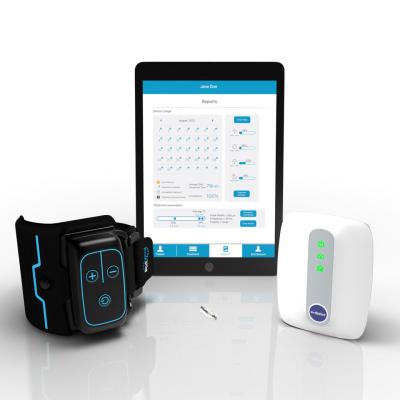After getting wind of a new approach to treating overactive bladder—several years after it earned CE mark clearance in Europe—the FDA has granted the technology de novo clearance in the U.S.
The neurostimulation system was developed by BlueWind Medical, which announced the regulatory win Thursday. While other neuromodulation approaches to treating incontinence rely on stimulating the sacral nerve in the lower back, BlueWind’s technology combines a small implanted device and externally worn ankle band to stimulate the tibial nerve instead.
Previously known as the Renova iStim, the system has since been renamed Revi. It was cleared to treat adult patients experiencing urge urinary incontinence (UUI), which causes a sudden and intense need to urinate.
The de novo clearance represents “a critical milestone that underscores BlueWind Medical’s unwavering commitment to developing an innovative alternative treatment option for the millions living with this affliction,” CEO Dan Lemaitre said in the company’s announcement.
“As we embark on this exciting new chapter, we remain dedicated to our mission of improving the lives of the patients we serve by helping them regain control of their UUI symptoms,” he added.

The three-centimeter-tall, battery-free Revi implant is placed near the ankle, not far under the skin, in a minimally invasive surgery that can be completed using only local anesthesia. To activate the device, users strap a wireless wearable device—which houses the system’s power source—around their ankle for 30-minute sessions once or twice a day.
During each session, the implant stimulates the posterior tibial nerve, with a goal of blocking the nervous signals linked to incontinence before they can reach the brain. The wirelessly connected Revi Hub, meanwhile, collects information about each therapy setting and automatically transmits it to the Clinician Programmer app, where doctors can view and adjust their patients’ therapy settings.
The patients themselves have access to the myRevi app, which provides educational materials about UUI, a symptom-tracking feature to monitor their response to the neurostim therapy and tech support for the Revi system.
According to BlueWind, the FDA’s nod was based on the results of the recent Oasis trial, which recruited 151 women with UUI to be implanted with the system. After six months, just over three-quarters of all of the implanted participants saw their number of urge incontinence episodes cut at least in half—a number that grew to 82% of the 139 subjects who completed the full year-long study.
Those participants who remained in the study for a year were found to have used the Revi system regularly, complying with the once-daily treatment regimen nearly 92% of the time.
Adverse effects linked to the procedure or device that occurred during the study were classified as only mild or moderate, with no serious events reported, per BlueWind.
The FDA clearance comes about seven years after Revi was first OK’d in Europe in 2016.
More recently, in May 2022, BlueWind closed a $64 million funding round, which the company said at the time would be put toward commercializing the neuromod system in the U.S. as soon as the FDA had given the greenlight. The series B round was led by ConvaTec, a fellow maker of incontinence-targeting devices.